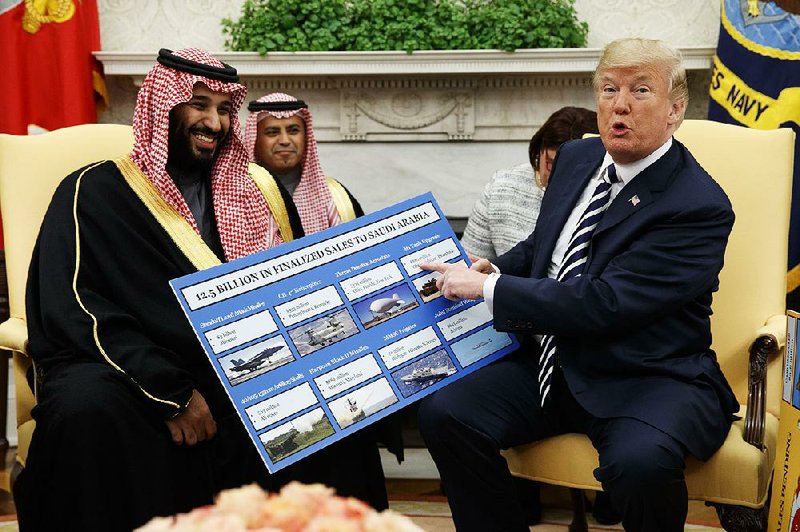WASHINGTON -- The suspected slaying of a prominent Saudi journalist exposed a growing rift Thursday between the White House and Congress over U.S. policy on Saudi Arabia, as Republican lawmakers demanded an investigation of Jamal Khashoggi's whereabouts even as President Donald Trump declared his relations with Riyadh "excellent."
The Saudi-led, U.S.-backed bombing campaign of Houthi rebels in Yemen -- which has killed thousands of civilians -- was already a source of tension between Congress and the Trump administration.
But last week's disappearance of Khashoggi, a well-connected Saudi columnist for The Washington Post living in Virginia, has incensed Republicans and Democrats in Congress, who accused the White House of moving too slowly in pressing the kingdom for answers.
"The Saudis will keep killing civilians and journalists as long as we keep arming and assisting them," Sen. Rand Paul, R-Ky., said Thursday on Twitter. "The President should immediately halt arms sales and military support to Saudi Arabia."
But Trump quickly made clear he would not.
"What good does that do us?" Trump asked, speaking to reporters midday in the Oval Office.
"I would not be in favor of stopping a country from spending $110 billion -- which is an all-time record -- and letting Russia have that money and letting China have that money," Trump said, referring to an arms deal with the Saudis, brokered last year, that the president has said will lead to new U.S. jobs.
Earlier Thursday, in an interview with Fox & Friends, Trump said U.S. investigators were working with Turkish and Saudi officials to determine what happened to Khashoggi, who has not been seen since Oct. 2 after he entered the Saudi Consulate in Istanbul. Turkish officials suspect a Saudi hit squad killed and dismembered Khashoggi inside the consulate.
The president said he and his administration are "looking at it very, very seriously" and expected to have more information soon.
"We want to find out what happened," Trump said. "He went in and it doesn't look like he came out."
"We don't like it," Trump said. "I don't like it. No good." But he added that relations with the kingdom were "excellent."
The pressure from Congress could force the White House and State Department to change certain aspects of foreign policy -- including possibly withdrawing support for the Saudi-led campaign in Yemen's civil war. In June, a key vote on arms sales to the Saudis was narrowly approved, and future munitions sales have been held up.
On Wednesday, the leaders of the Senate Foreign Relations Committee sent a bipartisan letter to Trump demanding an investigation of whether "the highest ranking officials in the Government of Saudi Arabia" were responsible for human-rights abuses in Khashoggi's case.
The letter invoked a statute that Congress enacted in December 2016 that says the executive branch, upon receipt of such a letter, has 120 days to decide whether to sanction foreign officials.
It is not clear, however, whether the Trump administration will consider itself bound to comply if the president does not want to tangle with the Saudis. When former President Barack Obama signed the legislation creating that law, he issued a signing statement challenging it as an unconstitutional intrusion on executive power.
The Trump administration was widely criticized for its relative silence on Khashoggi's disappearance until Monday, six days after he entered the Saudi Consulate. Critics said the slow reaction could embolden leaders of Saudi Arabia and other authoritarian nations to carry out human-rights abuses.
The intense scrutiny of Saudi Arabia and its crown prince, Mohammed bin Salman, may strain his close relationship with Jared Kushner, Trump's son-in-law and top Middle East adviser. Kushner had been cultivating the prince's support for an Israeli-Palestinian peace plan, but King Salman of Saudi Arabia has rejected it.
There are indications that the operation targeting Khashoggi was at least approved by Prince Mohammed.
U.S. intelligence agencies have collected communications intercepts of Saudi officials discussing a plan to lure Khashoggi back to Saudi Arabia and then detain him, said a former senior U.S. official. The official added that it was inconceivable that such a plan could be carried out without the approval of the crown prince.
Turkish security officials suspect Khashoggi was killed by a Saudi murder squad sent by the kingdom's leadership, and that his body was dismembered with a bone saw and taken out of the building. A Turkish newspaper close to the government published names of 15 suspects who are believed to have left Turkey to return to Saudi Arabia the same day on two private planes; one is a top Saudi autopsy expert and another a lieutenant in the Royal Saudi Air Force.
Saudi leaders maintain Khashoggi left the consulate on his own.
A Section on 10/12/2018
